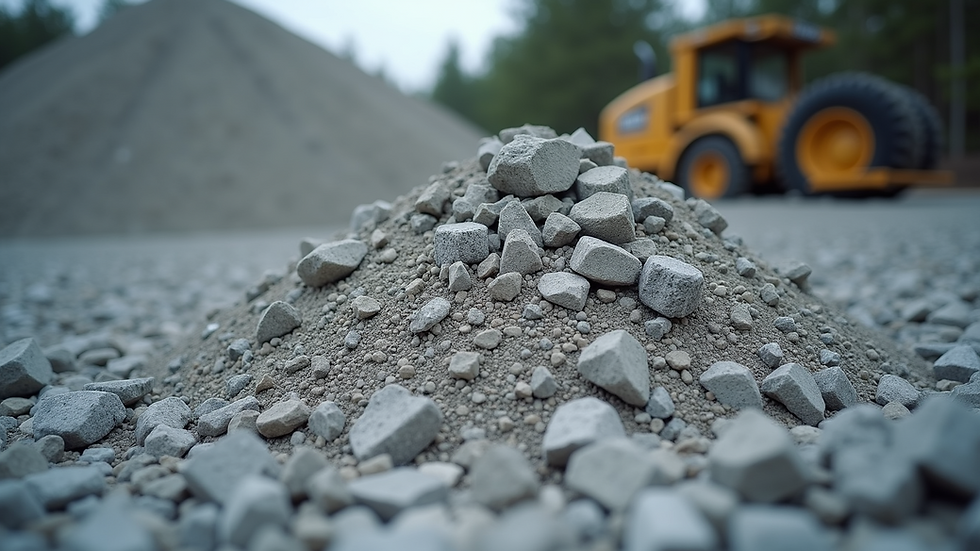Sustainable Recycling Solutions for the Construction Industry
- Nasser Qari
- Nov 1, 2025
- 4 min read
The construction industry produces a significant amount of waste every year, contributing heavily to landfill overflow and environmental degradation. Finding sustainable recycling solutions is no longer optional; it is essential for reducing the environmental footprint of construction projects. This post explores practical, effective recycling methods that construction companies can adopt to minimize waste and promote sustainability.

Why Recycling Matters in Construction
Construction and demolition waste accounts for nearly 40% of total solid waste generated globally. Materials like concrete, wood, metals, and plastics often end up in landfills, wasting resources and increasing pollution. Recycling these materials reduces the need for raw resource extraction, lowers greenhouse gas emissions, and saves energy.
By recycling construction waste, companies can:
Cut disposal costs
Comply with environmental regulations
Improve their public image
Contribute to a circular economy where materials are reused rather than discarded
Common Recyclable Materials in Construction
Understanding which materials can be recycled is the first step toward effective waste management. The most common recyclable materials in construction include:
Concrete and Masonry: Can be crushed and reused as aggregate for new concrete or road base.
Wood: Often reused for framing or chipped for mulch and biomass fuel.
Metals: Steel, aluminum, and copper can be melted down and reformed without losing quality.
Plastics: Used in piping, insulation, and packaging, plastics can be recycled into new products.
Drywall: Gypsum from drywall can be recycled into new drywall or used as soil conditioner.
Practical Recycling Strategies for Construction Sites
Implementing recycling on construction sites requires planning and commitment. Here are some effective strategies:
1. Waste Sorting at the Source
Separate waste materials as they are generated. Use clearly labeled bins for concrete, wood, metals, and plastics. This reduces contamination and increases the value of recyclable materials.
2. Partner with Recycling Facilities
Work with local recycling centers that specialize in construction materials. Some facilities offer pick-up services, making it easier to manage waste without disrupting site operations.
3. Use Recycled Materials in New Construction
Incorporate recycled aggregates, reclaimed wood, and recycled metal into new projects. This reduces demand for virgin materials and supports the recycling market.
4. Educate Workers
Train construction crews on the importance of recycling and how to properly sort materials. Awareness leads to better compliance and less waste.
5. Plan for Deconstruction
Design buildings with future disassembly in mind. Using modular components and avoiding mixed materials makes recycling easier when the building is demolished or renovated.
Case Study: Recycling Concrete on a Large Scale
A major construction company in California implemented a concrete recycling program on a highway expansion project. Instead of sending concrete debris to landfills, they crushed and reused it as base material for the new road. This approach saved over 10,000 tons of concrete from disposal and reduced the need to quarry new aggregate. The project cut costs by 15% and lowered carbon emissions by an estimated 20%.
Benefits Beyond Waste Reduction
Sustainable recycling solutions offer benefits beyond just reducing landfill waste:
Energy Savings: Recycling metals uses up to 95% less energy than producing new metals.
Water Conservation: Reusing materials reduces water consumption in manufacturing.
Job Creation: Recycling programs create jobs in sorting, processing, and manufacturing recycled products.
Regulatory Compliance: Many regions require construction waste diversion, and recycling helps meet these standards.
Challenges and How to Overcome Them
Despite the benefits, recycling in construction faces challenges:
Contamination: Mixed or dirty materials reduce recycling quality. Solution: enforce strict sorting protocols.
Cost Concerns: Some recycling processes require upfront investment. Solution: consider long-term savings and environmental benefits.
Lack of Infrastructure: Remote sites may lack nearby recycling facilities. Solution: plan logistics early and explore mobile recycling options.
Design Limitations: Traditional building methods may not support easy recycling. Solution: adopt design-for-deconstruction principles.
Future Trends in Construction Recycling
The construction industry is evolving with new technologies and approaches that enhance recycling:
Advanced Sorting Technologies: Automated systems using AI and robotics improve material separation.
3D Printing with Recycled Materials: Using recycled plastics and concrete in 3D printing reduces waste.
Circular Building Models: Buildings designed to be fully recyclable or reusable at end-of-life.
Digital Waste Tracking: Software tools monitor waste generation and recycling rates in real time.
How to Start Implementing Recycling Solutions Today
Construction companies can begin their sustainability journey with these steps:
Conduct a waste audit to identify recyclable materials and current disposal methods.
Set clear recycling goals and communicate them to all stakeholders.
Invest in proper waste sorting equipment and training.
Build relationships with recycling partners.
Monitor progress and adjust strategies as needed.
Sustainable recycling solutions are achievable with commitment and planning. They not only protect the environment but also improve project efficiency and reduce costs. By adopting these practices, the construction industry can build a greener future.
If you are involved in construction, consider evaluating your current waste management practices and explore how recycling can fit into your projects. Small changes today can lead to significant environmental and economic benefits tomorrow.


Comments